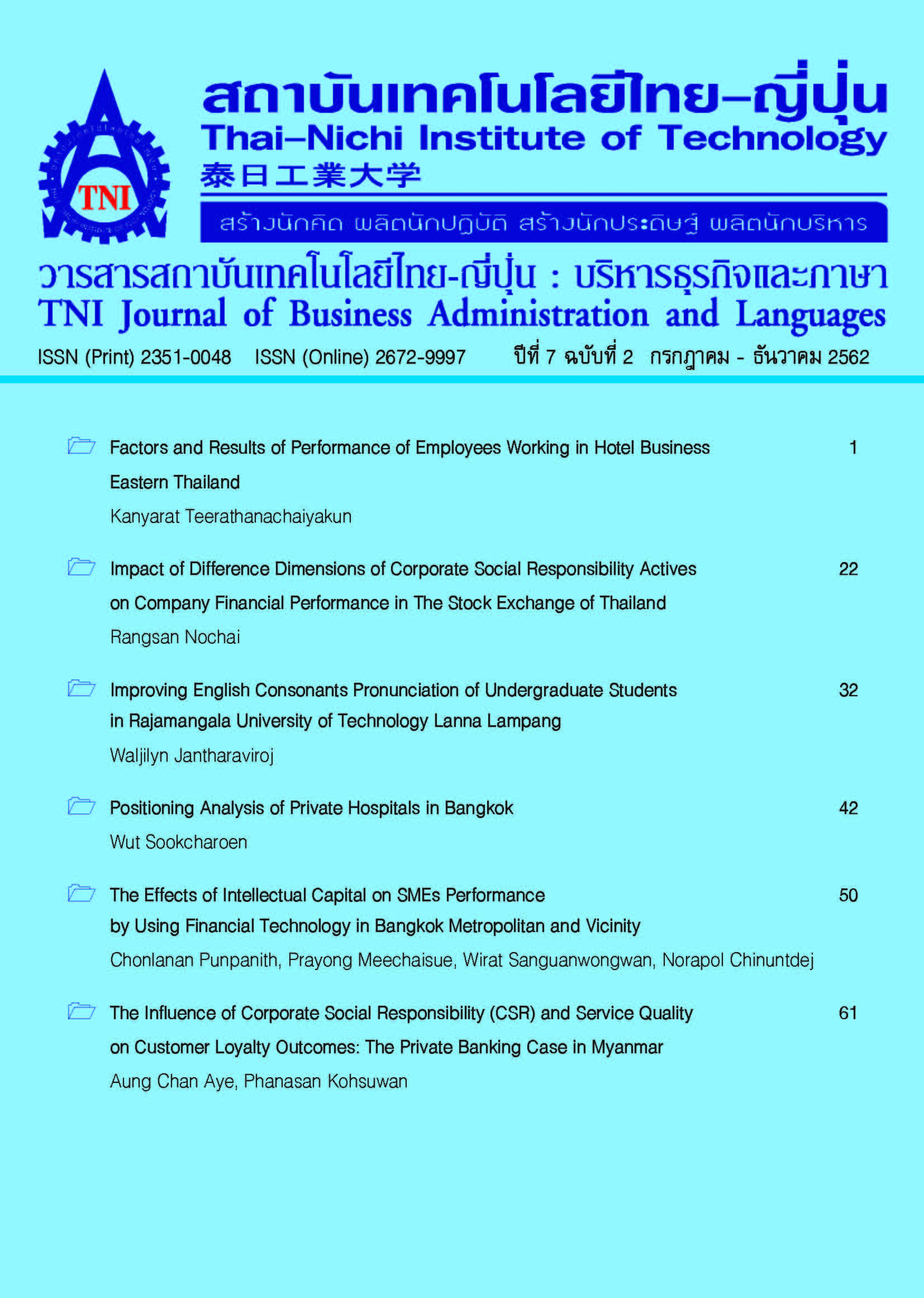The Study of Behavior and Brand Awareness of Thailand Health Tourism Image Among Japanese Tourists
Main Article Content
Abstract
The purposes of this study were 1) to study the data on demographic and behavior of Japanese tourists travelling to Thailand, and 2) to study brand awareness of Thailand health tourism image among Japanese tourists. This study used quantitative research methods. The quantitative questionnaires were collected from 385 Japanese tourists who visited Thailand. The questionnaires data analysis was based on the descriptive statistics. The study found that 1) the majority of Japanese tourists were male, aged 40-49 years, with educational background in undergraduate, full time employed with average monthly income, more than 500,000 yen, married, and, they visited Thailand more than 3 times. The factors affecting the decision on visiting Thailand were delicious food. The visitors searched for Thailand travelling data through internet. They traveled with family by package tour and they traveled during July - September. They spent more than 7 days in Thailand. Their experience in health tourism was Thai massage, and they would like to return to travel in Thailand again. 2) the factor with the highest point of brand awareness of Thailand health tourism image among Japanese tourists was that Thailand was a tourist destination for massage while Thailand was a tourist destination for onsen was less significant. The Japanese tourists with different genders, ages, and average monthly incomes had different overview opinions to brand awareness of Thailand health tourism.
Article Details
Article Accepting Policy
The editorial board of Thai-Nichi Institute of Technology is pleased to receive articles from lecturers and experts in the fields of business administration, languages, engineering and technology written in Thai or English. The academic work submitted for publication must not be published in any other publication before and must not be under consideration of other journal submissions. Therefore, those interested in participating in the dissemination of work and knowledge can submit their article to the editorial board for further submission to the screening committee to consider publishing in the journal. The articles that can be published include solely research articles. Interested persons can prepare their articles by reviewing recommendations for article authors.
Copyright infringement is solely the responsibility of the author(s) of the article. Articles that have been published must be screened and reviewed for quality from qualified experts approved by the editorial board.
The text that appears within each article published in this research journal is a personal opinion of each author, nothing related to Thai-Nichi Institute of Technology, and other faculty members in the institution in any way. Responsibilities and accuracy for the content of each article are owned by each author. If there is any mistake, each author will be responsible for his/her own article(s).
The editorial board reserves the right not to bring any content, views or comments of articles in the Journal of Thai-Nichi Institute of Technology to publish before receiving permission from the authorized author(s) in writing. The published work is the copyright of the Journal of Thai-Nichi Institute of Technology.
References
travel in Thailand of Japanese elderly tourists. (In Thai). Humanities and Social Sciences Thonburi University, 12(Special), 127-137.
Intellectual Property Innovation Driven Enterprise. (2018). Technology and industry trend analysis report. Bangkok: Chulalongkorn University Intellectual Property Institute.
International Trade Promotion office in Tokyo. (2017). Overview of the spa business in Japan. Retrieved from https://www.ryt9.com/s/expd/1080083
JTB. (2018). Recommended tours in Bangkok. Retrieved from
https://www.jtb.co.jp/kaigai_guide/asia/kingdom_of_thailand/BKK/
Krejcie, R. V,. & Morgan, E. W. (1970). Educational and Psychological Measurement. Sage Journal, 30, 607- 610.
Mastercard. (2018). Global Destination Cities Index. Retrieved from https://newsroom.mastercard.com.
Ministry of Tourism and Sports. (2017). Situation and trend of tourism. Bangkok: The War Veterans Organization of Thailand.
Ministry of Tourism and Sports. (2012). Situation and trend of tourism. Bangkok: The War Veterans Organization of Thailand.
Ranee I. (2014). Niche Tourism Management, (In Thai). Nonthaburi: Sukhothai Thammathirat Open University Book.
Siriwan S., Prin L., Suporn S., and Ongart P. (2003). Marketing Management, (In Thai). Bangkok: Diamond In Business World
Tourism Authority of Thailand. (2010). Educational project for rewarding health travelers. eTAT Journal, 4, 1-21.
Tourism Statistic. (2018). International Tourist Arrivals to Thailand. Retrieved from https://www.atta.or.th/statistics-international-tourists-arriving-in-thailand-as-of-29-february-2016/
Wipawadee Leemingsawat, Nopparat Suthitakorn and Ketwadee Buddhahumbhitak. (2018). Potentiality and Attraction of Health Tourism Destination in Thai Regions. (In Thai). Academic Journal Institute of Physical Education, 10(1), 179-189.
Wipa Wattanapongchad. (1999). The factors influencing the decision of Thai tourists for visiting Phetchaburi Province. (Master' s thesis). Kasetsart University, Bangkok.


